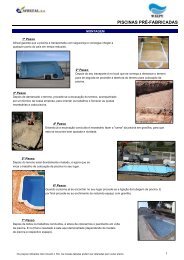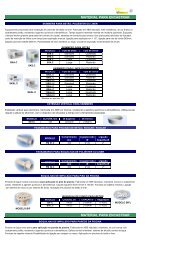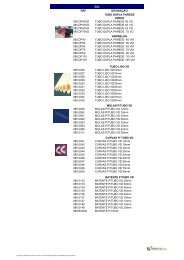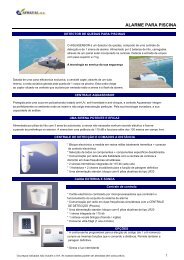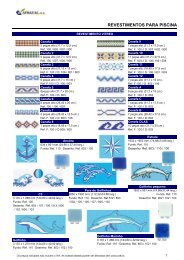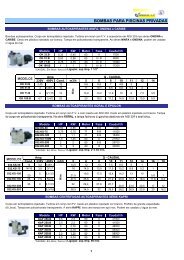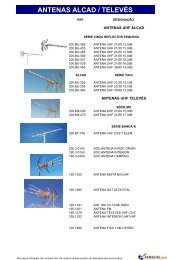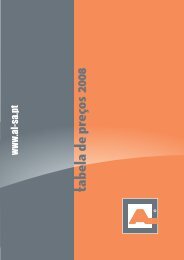televés - Afrizal, SA
televés - Afrizal, SA
televés - Afrizal, SA
You also want an ePaper? Increase the reach of your titles
YUMPU automatically turns print PDFs into web optimized ePapers that Google loves.
Memories Memories in in the the Making©<br />
Making©<br />
By By Sarah Sarah Whiteman, Whiteman, Associate Associate Development Development Director<br />
Director<br />
Memories in the Making© is an art program for<br />
individuals in the early and middle stages of Alzheimer’s<br />
disease or related disorders, which offers the opportunity<br />
for creativity and expression through the visual arts. The<br />
program is being piloted at three community sites in the<br />
metro Indianapolis. Those facilities<br />
include: Alliance Adult Day Services,<br />
American Village-American Senior<br />
Communities, and Forum at the<br />
Crossing-Sunrise Senior Living.<br />
Memories in the Making is a unique<br />
program for individuals with Alzheimer’s<br />
disease or other dementia to express<br />
themselves through art. Through the<br />
creative process of painting, these<br />
individuals speak to us, offering us the essence of themselves.<br />
The art they produce is a tangible means of expression,<br />
which speaks to the families, the professional caregivers and<br />
to the public.<br />
Groups of 5-10 individuals meet weekly in nursing<br />
homes, assisted living facilities and adult day programs to<br />
paint. Each group meets under the guidance of an art<br />
facilitator specifically trained to work with individuals with<br />
memory loss and dementia.<br />
Book Book Review<br />
Review<br />
Long Long Long Long Long Distance Distance Distance Distance Distance Caregiving:<br />
Caregiving:<br />
Caregiving: Caregiving:<br />
Caregiving: A A Survival Survival Guide Guide for for Far Far Far Away Away Caregivers<br />
Caregivers<br />
By Angela Heath<br />
Odds are that, like millions of other Americans, you are<br />
challenged with providing care to an elderly parent or relative.<br />
If your parent or relative lives in another city or another<br />
state, your situation is further complicated by distance.<br />
You are probably struggling with many difficult issues as<br />
you attempt to understand the person’s needs, make arrangements<br />
to meet those needs, and work with other family members<br />
and agencies that provide services. For a number of reasons,<br />
you may be feeling stressed, pressured, exhausted, and<br />
bewildered. You may be facing telephone and travel expenses<br />
related to providing care. You may be feeling intense conflicting<br />
emotions about the many different roles you must assume<br />
as caregiver. In all likelihood, you have other demands for<br />
your time and attention such as a spouse, children, a job, or<br />
your own health concerns.<br />
This month’s recommended reading, Long Distance<br />
Caregiving: A Survival Guide for Far Away Caregivers will<br />
12<br />
Memories in the Making differs from traditional arts<br />
and crafts offered for the elderly because it focuses on creative<br />
expression. The forms created are directed by the individual.<br />
The process is tailored to provide structure and support for<br />
the participant while at the same time allowing them to<br />
create their own message on the paper. It<br />
is not unusual for an individual to paint<br />
memories from long ago or something they<br />
can no longer find the words to express.<br />
The paintings, sketches and<br />
drawings created by these artists are highly<br />
expressive and often beautiful. In viewing<br />
the art the families, the caregivers and the<br />
public are often touched by the tangible<br />
evidence of what remains of the individual even after the<br />
disease has robbed them of so much.<br />
Thank you to our volunteer art facilitators, Carrie Grant,<br />
Debbie Nesbit, Jean Ramser, Mark Ramser, Debbie Scott,<br />
Jennifer Stearman and Ella Wagner, who have committed to<br />
facilitating this art program for 10 weeks during the summer.<br />
For more information or to volunteer for this program,<br />
please contact Sarah Whiteman, Associate Director of<br />
Development, at (317) 575-9620, extension 25 or e-mail:<br />
Sarah.Whiteman@alz.org.<br />
identify specific steps you can take to make long distance<br />
caregiving more manageable. Throughout the book, you are<br />
instructed to complete a number of basic tasks in preparing<br />
for a planned visit, or “care commute,” with your parent/relative.<br />
These tasks are designed to lay the groundwork for successful<br />
long distance caregiving. Chapters 2 through 6 cover<br />
information you will want to become familiar with prior to<br />
your “care commute.” These chapters will help you identify<br />
and prioritize what you need to accomplish during your visit.<br />
Chapter 7 covers the actual visit and chapter 8 covers how to<br />
adjust your plan of care. In chapter 9, you will find helpful<br />
information on housing options for your parent/relative.<br />
Throughout the book, you are asked to record information<br />
in a Care Log. A Care Log is an easy-to-use, concise<br />
record of the important information you will need throughout<br />
the caregiving period. It contains all the forms and exercises<br />
you will need to develop a plan of care.





